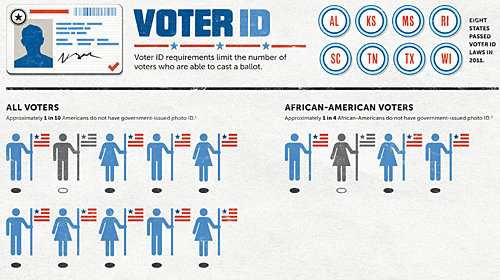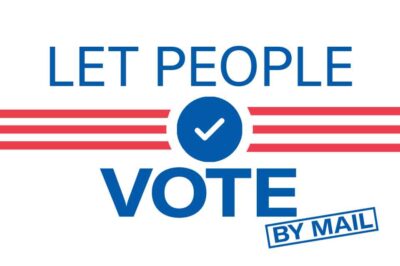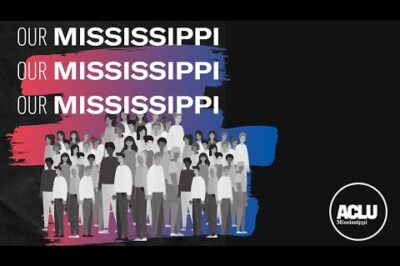
Defying the stereotype that they are apathetic or disengaged, young voters turned out in droves in the 2008 presidential election, capping off their record-setting participation in many state primaries and caucuses. Although the high water mark for turnout among voters under 30 remains 1972, which was the first presidential election after the Twenty-Sixth Amendment to the Constitution lowered the voting age to 18 years, the highest youth turnout in the past four decades happened in 2008 and 1992. Perhaps most significantly, 2008 marked the third consecutive presidential election that youth turnout increased, and nearly six out of ten young African-American voters turned out in 2008, which is the highest voter turnout among young people of any racial or ethnic group since the voting age was lowered.
Unfortunately, recently enacted state legislation could roll back much of our nation’s gains in the participation of youth and other traditionally marginalized groups. Last year, such measures were introduced in more than 30 states and 16 states ultimately enacted new or expanded barriers to the ballot box. Voter ID laws are the most popular of this new crop of suppressive legislation, with several states mandating a government-issued photo ID for residents to vote. These new laws also create more burdensome registration procedures and stricter residency requirements, reduce early voting, and make it more difficult for community based organizations to register young people.
The justification for these new laws, at least on paper, is that they help prevent voter fraud. To put the fear of voter fraud in perspective, consider the numbers: a rigorous, five-year investigation by the Department of Justice resulted in a mere 86 convictions for voting fraud out of more than 300 million votes cast. Those people – who couldn’t even fill a movie theater – were largely unaware of their ineligibility to vote.
According to the Brennan Center, a person is actually more likely to be struck by lightning than to commit in-person voter fraud, which is the only type of voter fraud that can be prevented by photo ID laws. Yet, at a time when our nation is confronting unemployment and state fiscal crises the likes of which we haven’t seen since the Great Depression, many state legislatures devoted time to passing voter ID laws unwarranted by evidence of voter fraud and guaranteed to impose a substantial economic burden on the state and individuals forced to obtain ID These new laws vary somewhat from state-to-state, but the majority of them now require residents to present a photo ID in order to vote, despite the significant barrier this poses to the 1 in 10 Americans who lack such ID.
Photo ID laws present young voters with a particularly high hurdle for two reasons. First, young people are less likely than the rest of the population to have a driver’s license, which is the most common form of government-issued photo ID. Second, one of the most common photo IDs that young people have – a student ID – is not considered an acceptable form of identification in almost half of the states (South Carolina, Tennessee and Texas) that recently enacted strict photo ID laws.
While three states may not seem like cause for alarm, let’s put those states in perspective: 1 out of every 10 of the millions of students enrolled in a degree-granting program of higher education nationally attends school in South Carolina, Tennessee or Texas. Of course, some of these students have another form of ID that it is acceptable under their state’s voter ID law. But, even if only a fraction of them lack another form of ID, we are talking about tens or hundreds of thousands of people – primarily young citizens – who would not be able to vote if all of these state laws go into effect. Youth of color are particularly disadvantaged by these ID laws, because they are even less likely than other young adults to possess an ID. For instance, a recent study in Wisconsin – which also recently enacted a new voter ID law – found that only 22 percent of African-American men between the ages of 18 and 24 have a current driver’s license.
Additional voter registration hurdles and stricter residency requirements (such as lengthening the period of residency required for an individual to register to vote) also disproportionately impact young people, because they move much more frequently than other groups of people. In fact, a team of researchers from Harvard and Yale suggest that while young people would likely register and vote at the same rate as older voters, the additional burden of re-registering every year or two brings down their numbers.Stricter residency requirements are especially problematic for students, who often move at the end of the academic year, but remain within the same district.
Since young people, particularly students, are more mobile and more likely to be first-time voters, they especially benefit from the work of non-partisan voter registration and education groups – who are also in the crosshairs of new voting law restrictions. Florida and Texas enacted laws last year placing onerous new requirements on community-based organizations conducting voter registration drives. In Texas, private citizens seeking to register voters now must not only be deputized by a local election official, they must also complete certain training requirements – which may even include a final exam.Florida’s new law, however, created a list of requirements for community-based voting registration so daunting – with potential felony criminal penalties – that the League of Women Voters and Rock the Vote suspended their work in the state. In the words of Deirdre Macnab, the President of the League of Women Voters of Florida, “Basically our volunteers, after 72 years of registering voters problem-free, would now need an attorney on one hand and a secretary on the other to even attempt to navigate these new laws.” Fortunately, a federal injunction has temporarily blocked the provision of Florida’s law that excessively burdens groups registering people in their communities, but not before a significant drop-off in voter registration numbers – in the first 3 months of this year, 81,471 fewer residents registered to vote than during the same time period in the last presidential election year – that some state election officials attributed at least partially to fewer community groups conducting registration drives.
So, looking at the big picture, why does all of this matter? First, we should always question when legislators make it more difficult to vote, particularly when the burdens are falling more heavily on groups – like young people and minorities – who have historically been excluded from the table. This is particularly so when the justification for these new laws – voter fraud – does not hold up under scrutiny. For instance, in the ACLU’s challenge to Pennsylvania’s voter ID law, the state attested to the fact that there was no evidence of in-person voter fraud in Pennsylvania. The new law, however, ,could exclude more than one million registered voters in the state from casting a ballot in November. Yes, you read that correctly – more than one million people are impacted, in just one state.
The second thing to keep in mind is that the consequences of pushing young voters out of the electorate could have a significant impact not only in the campaigns this year, but also down the line. Voting, like many other things, is habit-forming. As Generation Y, or the Millennials come of age, it will be important that they continue to participate in the political process. Young voters were energized and engaged in 2008, and they were part of a coalition that was decisive in the outcome of the presidential election.
Finally, the consequences of these new voter restrictions on youth have a cumulative effect. Each new barrier to a young person registering or casting a ballot will further reduce the likelihood that young people will be able to participate. While democracy requires constant engagement on our parts, our most fundamental right as citizens, to vote, should be sacrosanct. Voting should not be like an obstacle course, where only the strong – or in this case, those with expendable time or money – reach the finish line.
As we are on the precipice of taking a large step backward in youth voting, which will particularly impact youth of color, the ACLU will continue to challenge these regressive voting laws in court, advocate for full enforcement of federal laws and passage of new federal laws to expand and protect the franchise,and make sure that you are informed about your state’s laws.
Learn more about voter suppression: Sign up for breaking news alerts, follow us on Twitter, and like us on Facebook.





